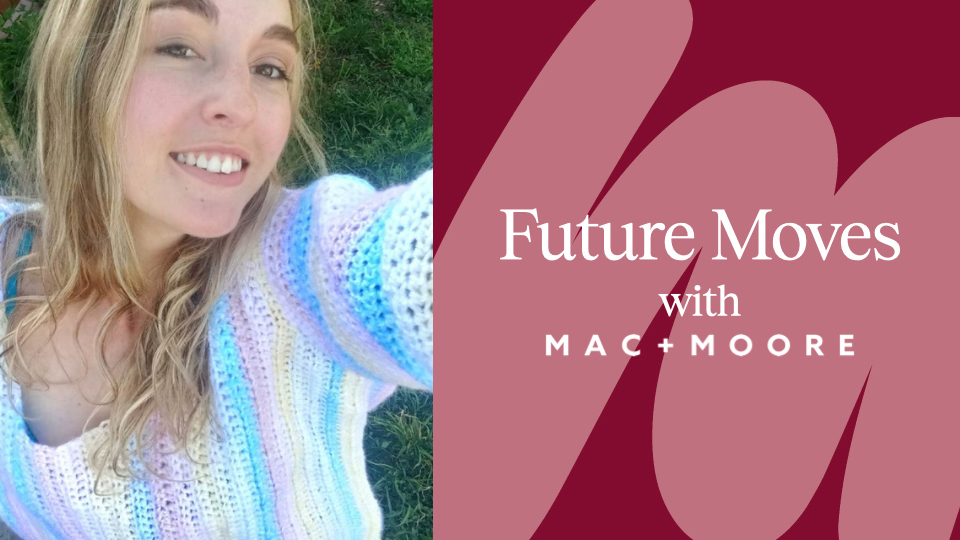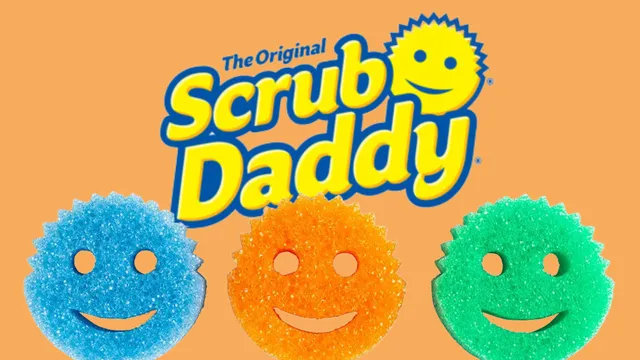Future Moves with Carolyn McMurray, Founder of Word Tonic
Hello there! We’re switching up our usual Future Moves intro by extending an invitation! We’re hosting an online event next month to celebrate Project Fearless (an incredible non-profit organisation we built the brand for 5 years ago) We’ll be sharing tips and tricks for building brands that stand the test of time.
Click the image below for more info and tickets 🥳

And now for our regularly scheduled programme…
Carolyn McMurray, Founder of Word Tonic

🔥 Why you don’t need a degree to win at copywriting
🔥 How Andrew Tate uses a copywriting community to influence people against women
🔥 Why a Scrub Daddy being fed by a spoon is brand gold for Gen Z
Carolyn is a 24-year-old copywriter and introvert who just so happens to have built a community of 1,000 global Gen-Z copywriters called Word Tonic. Her mission is simple: to help other young people like her break into advertising in a more accessible, fun way. Fun facts about Carolyn: she has ZERO degrees, started copywriting at 17, and surfs (very badly we’re told).
We seem to have an obsession with Gen Z. Every brand talks about them, employers always seem to be complaining about them. But is Gen Z lazy or just misunderstood? What do they look for in brands that are different from us millennials? Do they have ambition or are they just snowflakes who want to use AI to get to an easy answer? These are the questions we wanted to sit down and discuss with Carolyn on how Gen Z creatives really think and feel.

Jess: Can you introduce yourself to our readers?
Carolyn: My name is Carolyn, I'm 24 years old and I have been doing copywriting since I was like 17. Word Tonic is a learning platform and community for young people that want to get into copywriting, from scratch. It’s for Gen Z copywriters, who want a space full of people that are the same age and who want to upskill.
Jess: Not having a degree can be seen as a barrier to getting into any industry. How did this affect your experience as someone who jumped straight into the world of work?
Carolyn: I always wanted to do university but it didn’t work out for me. I found that whatever copywriting jobs I applied for they always ask for an English degree. I think they're just doing that to weed out people that don't know how to write. I think if you're really good, they don't care and it's just something they just do as a tick box exercise. If I’m being really honest I think at some stages I just didn't mention that I didn't have a degree. There was a part of it, and this is me being cheeky, but I was like, are they really going to ask to see a piece of paper to prove I have a degree? But then I started realising to just lean into it instead of being afraid that people weren’t going to work with me. So once I started doing that, and saying on LinkedIn I dropped out of uni it was the best decision ever because instead of making it a bad thing it's been a really good thing. It meant I spent more time trying to build up my copywriting portfolio. I think it's also a brave move as well. So leaning into it rather than being shamed is really helpful.
Jess: What gave you the idea to set up Word Tonic?
Carolyn: At first I just really wanted to build an audience I could talk to. My partner gave the advice that I had to build an audience around something specific. And then suddenly out of nowhere, this idea of doing a newsletter for young copywriters came into my head because I'm sure there are others out there talking about copywriting. But there was none with that very specific angle of “I'm a young copywriter. I'm talking to other young copywriters, here's my experience.” That was Word Tonic at the start. And then six months in, a lot of people are asking me, what's copywriting? They also wanted to learn about it and they kept asking for lots of advice. I was like we could create a community out of this. I think at that stage the newsletter was only 300 people. That's actually where I started from, like wanting to do a newsletter for young copywriters and it just kind of snowballed from there.
Jess: What do you think are some of the ingredients for success in creating and building a community?
Carolyn: I think you need to figure out the levers first, the things that you do that will get you members. For me, it's been events with industry names and I do them once a week. They bring in a nice amount. The second one is being consistent and active on social media channels such as Instagram and LinkedIn. The newsletter also does a good job at cold outreach. I also think it’s so important to get your community engaged and involved. A big thing that's helped us grow is that I give loads of members the autonomy to play a role in the community. For example, they recently created a disability channel. It was the same with the neuro spicy channel, there were so many neurodivergent people in the community and they wanted a specific space on our platform. I was like, Okay, you create it. Our community is really diverse in that way.
Jess: What do you think unites everyone in the community? Why do they choose your platform?
Carolyn: I would say in our community there is a real love of writing. A lot of people think Gen Z are lazy. I think we're not lazy, but we're only going to spend time on something we really want to do. And I don't think a lot of us are given proper options at school, I mean copywriting isn’t ever spoken about as an option for a career! So I see all these people coming in and everyone is super ambitious. I think you just have to give us more diverse options of what we can do with writing. It's not just journalism or publishing it can be about so much more than that.

Jess: What’s the competition like? Are there others doing what you’re doing and what makes them different?
Carolyn: I see a lot of it in the copy space. Did you know Andrew Tate has his own copywriting community? I don't know how much it is. There's another one called Tyson 4D. I entered their discord just to see what they were doing. They talked about copywriting a little bit but it was along the lines of those weird sales funnels and not at all about being creative. Then they were all talking about women, saying that women are the devil and they're trying to distract you…. And I'm like, Wait, is this a copywriting community or a I hate women thing?
Jess: So do you think Gen Z has a more entrepreneurial mindset?
Carolyn: Yeah, especially in the community a lot of them are very entrepreneurial. They're picking up graphic design, or they're really good at social or filmmaking on top of copywriting. And it's just natural to them. I’d say that a lot of us see ourselves as hybrid creatives. They're just super ambitious. If I look at our community this is a collection of people who really want to do cool stuff and they're really open to trying new things. They're not scared to take on a challenge. They're also not scared to put stuff out there. They'll tag brands that they want to work for on LinkedIn, they'll DM people they admire. When it comes to being paid your worth I feel like if I'm doing work and it's as good as the senior I should get paid as much and now this whole community thinks this way.
Jess: Gen Z stereotypes - are any real? And which are the ones you push back against?
Carolyn: I'm a “just get on with it” type of person. For example my mum recently passed away and it's sad. But I see no point in wallowing in it. But that's me. I do think there's maybe a little bit of truth to the fact that my generation is a bit snow-flaky. I watched a video online where a girl was saying how she had a problem with being late and on time. And I was like, that's just stupid. But the whole mental health subject I think it's always there and is real. Maybe in the past, people didn't have a name for the things they were thinking and going through and now we have a space where we can talk about it a lot more. I think that's the only reason why I think back in the past, they had it as well, but it wasn't really spoken about now. It's like everyone's talking about it.
Jess: What are your community’s favourite brands?
Carolyn: Everyone that I've spoken to in the community just wants to work for the fun brands. Probably a big one for some weird reason is Scrub Daddy. If you know them or if you don’t you should look them up on Instagram. They're literally a washing-up sponge, but they've made washing up fun. On their Instagram they do weird reels of like a spoon going into the Scrub Daddy's mouth. It’s funny. Monzo was another one. Which is weird. I was like, Oh, it's just a bank. I don’t get it. But I think they like their tone of voice. You know, they like fun, but they're not crazy.

Jess: You’ve had some great speakers from big brands in your community. What are the highlights and why?
Carolyn: James Whatley was just so cool. And just said it how it is because some people were asking questions along the lines of “how can people in the industry help me” and he was just honest that you needed to put in the work as no one's gonna do it for you. He was just really helpful.
Jess: Managing a community must be a big responsibility. So what have been the challenges? And how have you faced them?
Carolyn: There's been a few around what’s going on in politics with everything that's going on in the world right now. Some people expect me to take a hard stance. And I will just say no, like, I'm not doing anything political. My goal is to help uplift young people. So for example I will do a Pride Month post focused on uplifting the LGBTQIA members in the community. But we're not political. Another thing that happens very rarely, but there's always one person that just doesn't get social cues at all, for example someone asking “can you help me get a job, help me”. And like in the masterclasses, they'll say to the speakers from big brands “Oh, can you give me a job.” Like, stop? It's really embarrassing me. And when I see that behavior I refund the person and I kick them out. Otherwise, everyone's just getting upset by them.
Jess: What are you most proud of?
Carolyn: I'm gonna say two things. The first is the number of members and I'm really happy with that. And then on the other side, which is the thing that really drives me more than the number part is the fact that our community is really helping people. We have an achievements channel and when I go through them it's amazing as the members are doing so much stuff. We have a small recruitment service, where we connect brands to copywriters. I made an intro between one member to a brand who had never done copywriting before professionally. Now she's on a 75k salary. And it's changed her life. And that, to me, is amazing.
Jess: What’s your perspective on AI? Friend or foe?
Carolyn: I'm excited by AI. I'm not scared by it. I know, there's a divide, especially on LinkedIn between copywriters who hate it. There's people that are embracing it. I'm embracing it. And I think it's going to change stuff quite a bit. I think it's a great chance to evolve and get even better. We're going to lose our jobs. This is a time to level up and become even better and try something new. I see it as being, it sounds kind of weird, but like a bionic copywriter, part writer, which I don't mind, I think AI is really great at getting stuff done efficiently.
How We Move Forward:
A book, podcast or cultural movement that's made you think differently? I guess this is a cultural thing but Cindy Gallop’s Make Love Not Porn movement. I’m big into sexual liberation. And I think another thing that's really opened up the way I see things has been Killing Kittens. I'm gonna put it out there. I'm really into that kind of stuff. And at some point, I'd love to talk about it more. Changing the way people view sex and stuff like that and changing that industry for the better. That's cool. I like that.
Which future technology (or application of existing tech) are you optimistic for? Any tools that give people more access and ability to create. We need more ideas out there.
Your hope for creativity in the future? I think maybe AI. I think it's great. But I still hope that the industry values human creativity, because if they don't, then they will probably die. But I don't think it will. I think there's still something about proper human creativity that a machine just can’t replicate. It's not a human. It doesn't have feelings. Words have to have a heart.
Who do you follow online for ideas, inspiration + advice? Vikki Ross, because I love her and she's also my mentor. So that helps. She has Twitter and she's always showing so many different copywriting gigs. And then I also like Farnam Street. They're just really cool. I feel really dumb after reading them in a good way.
One word to describe your hope for the future? Hyper-accessible
Welcome to the end (of the email).
If you’re reading this, then we’ve successfully gripped you from start to finish, or else you’ve just done a giant scroll to check how long it is.
Either way, if you’ve found a nugget of wisdom in these words, we’d love you to share them. Forward to a friend to add a boost of hopefulness to their inbox, or share a quote on social.
We’ll see you in a couple of weeks with more Future Moves!